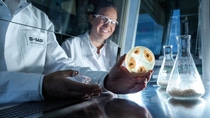Driving sustainability with microorganisms
Media
Research Press Conference
The chemical industry is in the midst of a fundamental transformation, which BASF is driving forward with new concepts and approaches in its raw material base and its product development.
At this year’s Research Press Conference, we want to present some of our solutions and explain, why White Biotechnology is becoming increasingly important for the chemical industry, why BASF and LanzaTech are jointly developing a process that enables chemicals to be produced from alternative carbon sources such as industrial off-gases, and why basic research on biodegradability makes an important contribution to developing sustainable products.
To master global challenges such as climate change and make the best use of limited natural resources, our society needs innovations from chemistry more than ever. In addition to approaches from chemistry, biotechnology is opening up many new opportunities for us in this regard.”

Recording of the presentation
White Biotechnology – One key element of BASF’s toolbox
White biotechnology has become one of BASF’s key technologies. It enables us to produce using a variety of feedstocks in an efficient, resource-conserving and, most importantly, flexible manner.”

Recording of the presentation
BASF and LanzaTech – Alternative carbon sources for chemical value chains
Gasification technologies for residual materials, gas fermentation – together with sustainable hydrogen and renewable energies for product synthesis – and efficient purification processes for the product outputs can, in the future, make an important contribution to improving the sustainability of our value chains.”

There are more than enough alternative carbon sources worldwide that can be used for gas fermentation. But this will require a change of mindset to enable projects with a cross-sectoral character, for example, connecting the chemical industry with steel mills or waste management firms.”

Recording of the presentation
From the fundamentals of biodegradability to sustainable products
We look in great detail at how we should design materials so that our products biodegrade in soil and in technical systems such as compost and sewage treatment facilities. This incredibly complex topic can only be mastered as an interdisciplinary team together with internal and external partners such as customers, universities as well as research institutes.”





